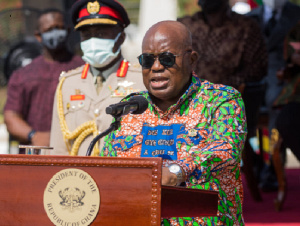 President Nana Addo Dankwa Akufo-Addo
President Nana Addo Dankwa Akufo-Addo
President Nana Addo Dankwa Akufo-Addo Tuesday launched Ghana’s Financing Roadmap for the realization of the 2030 United Nations Sustainable Development Goals (SDG’s).
The roadmap, a partnership with the World Economic Forum’s Sustainable Development Investment Partnership (SDIP), seeks to forge a more effective public-private engagement for sustainable financing to ensure the successful implementation of the UN’s Agenda 2030.
Launching the initiative at a roundtable at the Jubilee House, Accra, President Akufo-Addo said Ghana’s commitment to the SDGs was borne out of a fundamental belief that the SDGs, which were at the heart of the development challenges faced by the nation, offered significant prospects for Ghana’s transformation and development.
He stressed that the SDGs will continue to be the driving factors in the formulation of Ghana’s development policy, and of her overall resource allocation.
“One thing that is clear is that the pandemic has not only heightened our challenges, but it has also created new ones, and exacerbated the financing gap that we face in the implementation of the SDGs.
“And, it is, further, abundantly clear to me that, if we are going to be successful in our endeavour, the key considerations will be the scope, scale and quality of partnerships that we establish with the private sector, and how smart and innovative we are in mobilizing financing and private investments to support implementation of the Goals”
The President indicated that Ghana’s Financing Roadmap, estimated at some US$450 billion over the next decade to 2030, offered the private sector a distinct opportunity to make significant contributions towards the national agenda to achieving SDG’s.
He emphasised that Ghana’s commitment to the attainment of the SDGS was unwavering and as it formed the fundamental base to the country’s recovery efforts from the COVID-19 Pandemic.
The recovery programme would yield faster results by striking the right partnerships with the private sector in the areas of research, energy, health, communication, education, and water and sanitation and making agriculture the fulcrum of growth.
President Akufo-Addo said his government was determined to enhance a productive partnership with the private sector to unlock innovative and sustainable financing to bridge the SDGs financing gap.
“Against the backdrop of the huge financing gap, perhaps more than ever, we need a stronger, mutually beneficial partnership with the private sector. This is because it is you, in the private sector, who generate the wealth, which provides the means for our economic and social investments.
“We are determined to build a prosperous nation, and, as we seek to do so, we will not relent in our commitment to fiscal discipline, our pledge to dismantling any obstacles to private investment, our determination to ensuring a progressive investor-friendly business landscape, our resolve to enhancing social investments, and, critically, our vision of building a Ghana Beyond Aid, with the private sector at the fulcrum,” he said.
The President further indicated that his government through the Ministry of Finance was preparing diverse schemes of bankable SDGs initiatives, which would form the basis for a catalogue of well-prepared, commercially attractive projects.
He said work was also ongoing to develop an SDGs Investor Platform, that would provide market intelligence on investment opportunities in the country and related impact data, to identify and increase SDGs-aligned investments.
The President extended an invitation to the private sector, domestic and foreign, to take full advantage of the great SDGs-related business opportunities that presently exist in Ghana.
He reinforced the commitment of Government to join “hands with all of you to forge strong and beneficial partnerships, leveraging our relative strengths, and mobilizing the financing needed to address the critical development challenges that our country and, indeed, humanity and our planet face. And, in so doing, we shall ensure that we leave no one behind”.
It is estimated that Ghana would require some $522.3billion averaging an annual financing requirement of some $52.2billion to achieve the SDGs between 2021 and 2030.
The roadmap outlines a country specific strategy, assesses its current status and offers concrete action to mobilise new resources towards meeting national sustainable development priorities and financing over the next 10 years.